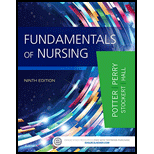
Concept explainers
To determine:
The patient (J) comes to the emergency department of the hospital with the absence of appetite and rectal pressure. The nursing assessment questions that nurse asks the patient (J)?
Concept introduction:
On the next visit of the patient (J) 2 days later, the home care nurse (J) found that the patient (J) is still had not had a normal movement of the bowel and his blood pressure is 160/92 and the patient (J) is tried to increase the intake of vegetables and fruits but he had a very small appetite and felt mildly nauseous after eating a meal. The patient (J) took every evening a laxative with a stool softener but the patient describes that small, liquid bowel movement 2 to 3 times a day. He takes his medicine but also he feels pressure in his rectum which is not relieved. The patient (J) is having elevated blood pressure, the absence of bowel movement and increasing discomfort for at least 9 days. The home care nurse (J) thinks that the patient (J) should go to the emergency department of his local hospital.
Explanation of Solution
The essential physical factors to defecation and bowel function include sensory awareness of the rectal contents and rectal distension, normal gastrointestinal tract function, sufficient rectal capacity, voluntary sphincter control and compliance. The defection is started with motion in the left colon and moving the stool in the direction of the anus. During the time of defecation, the outer sphincter relaxes and muscles in the abdomen contract, increase the pressure in intra-rectal area and forcing the stool away. The normal defection results in painless, moving of soft and formed stool.
The nursing assessment questions that nurse asks to the patient (J) in the given case follow:
- 1. How long have you had the problems with constipation?
- 2. When was your last bowel movement?
- 3. How many bowel movements do you have in a representative week?
- 4. Have you at any time needed to have a bowel movement manually removed?
- 5. Which medicine do you take?
- 6. How much water do you drink?
- 7. What did you have to eat the day before today?
The patient is required to change the diet or intake of fluid if there is straining during the bowel movement. Doing regular exercise and drinking more water helps to for the normal stool movement through colon.
Want to see more full solutions like this?
Chapter 47 Solutions
Fundamentals of Nursing, 9e
- a. Define neoplasm b. Differentiate between benign and malignant tumours c. Describe the molecular basis of cancerarrow_forwarddifferentiate the extra heart sounds S3,S4, murmurs and gallopsarrow_forward• Define shock and list types of shock • Discuss pathogenesis of septic shock. • Enumerate the stages of shock. • Define oedema and describe the pathophysiologic mechanisms of oedema with examples.arrow_forward
- Discuss Hypertension under the following headings: Definition Diagnosis Non-pharmacological intervention Drugs Classification Management of a Hypertensive emergencyarrow_forwardExplain how the answer could be 2 or 1.8 WITHOUT changing the questionarrow_forwardoverview of the neurological system, cranial nerves and what part of the body it innervatesarrow_forward
- differentiate structure and function of the peripheral vascular system. what are the normal and abnormal findings of the peripheral arterioles and peripheral venous systemarrow_forwardAn overview of the skin, hair and nails epidermal appendages normal and abnormal findingsarrow_forwarddifferentiate the twelve cranial nerves and how to test themarrow_forward
- What are the nursing interventions for patients with GI problems ? What is the priority ?arrow_forwardAdult Nutrition Assessment Date of consultation: 3/2/25 Reason for Nutrition Assessment: Mrs. Clover was referred to the RD from the ER physician; patient experiencing weight loss, SOB & Edema Nutrition Assessment Data 69 YOF Ht 157 cm, Wt 53 kg. BMI 21.7 Usual wt 55 kg Heart: slight physiologic murmur; lungs: clear; extremities: 3+ edema to bilateral lower legs; elevated BP, abdomen: soft, nontender, active bowel sounds; neurologic: unremarkable; skin: diminished skin tugor. Biochemical Data BUN 72, Creatinine 4.6, Calcium 7.2, Phosphorus 7.3, glucose 105, BNP 720, Albumin 2.0, Na 125, K 3.3, CI 93. Hgb 11.5, Hct 33.2, ALT 29, AST 36, Alkaline phosphatase 120, other relevant labs pending result. Medications Include inhalers, Cymbalta, Neurontin, Seroquel, and topiramate, prilosec, solumedrol, rocephin, zithromax, NaCl 0.45%+50 MEQ sodium bicarbonate @100 ml/hr. No history of herbal supplements. Since her pneumonia diagnosis several days ago, she has felt too weak to prepare meals, she…arrow_forwardAssuming you are a community health nurse, choose a community of your own and perform practically the following and report your findings: a. Community Assessment b. Community Diagnosisarrow_forward
 Phlebotomy EssentialsNursingISBN:9781451194524Author:Ruth McCall, Cathee M. Tankersley MT(ASCP)Publisher:JONES+BARTLETT PUBLISHERS, INC.
Phlebotomy EssentialsNursingISBN:9781451194524Author:Ruth McCall, Cathee M. Tankersley MT(ASCP)Publisher:JONES+BARTLETT PUBLISHERS, INC. Gould's Pathophysiology for the Health Profession...NursingISBN:9780323414425Author:Robert J Hubert BSPublisher:Saunders
Gould's Pathophysiology for the Health Profession...NursingISBN:9780323414425Author:Robert J Hubert BSPublisher:Saunders Fundamentals Of NursingNursingISBN:9781496362179Author:Taylor, Carol (carol R.), LYNN, Pamela (pamela Barbara), Bartlett, Jennifer L.Publisher:Wolters Kluwer,
Fundamentals Of NursingNursingISBN:9781496362179Author:Taylor, Carol (carol R.), LYNN, Pamela (pamela Barbara), Bartlett, Jennifer L.Publisher:Wolters Kluwer, Fundamentals of Nursing, 9eNursingISBN:9780323327404Author:Patricia A. Potter RN MSN PhD FAAN, Anne Griffin Perry RN EdD FAAN, Patricia Stockert RN BSN MS PhD, Amy Hall RN BSN MS PhD CNEPublisher:Elsevier Science
Fundamentals of Nursing, 9eNursingISBN:9780323327404Author:Patricia A. Potter RN MSN PhD FAAN, Anne Griffin Perry RN EdD FAAN, Patricia Stockert RN BSN MS PhD, Amy Hall RN BSN MS PhD CNEPublisher:Elsevier Science Study Guide for Gould's Pathophysiology for the H...NursingISBN:9780323414142Author:Hubert BS, Robert J; VanMeter PhD, Karin C.Publisher:Saunders
Study Guide for Gould's Pathophysiology for the H...NursingISBN:9780323414142Author:Hubert BS, Robert J; VanMeter PhD, Karin C.Publisher:Saunders Issues and Ethics in the Helping Professions (Min...NursingISBN:9781337406291Author:Gerald Corey, Marianne Schneider Corey, Cindy CoreyPublisher:Cengage Learning
Issues and Ethics in the Helping Professions (Min...NursingISBN:9781337406291Author:Gerald Corey, Marianne Schneider Corey, Cindy CoreyPublisher:Cengage Learning





